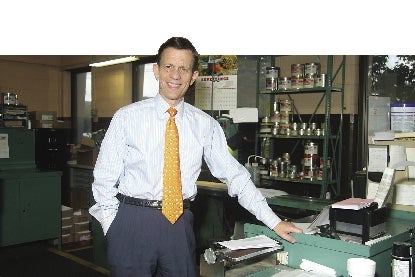Small businesses can be the lifeblood of neighborhoods and communities throughout Central Massachusetts. But while many of the entrepreneurs that run these entities may have great ideas, they don’t always have traditional business training.
That’s where governments and nonprofit organizations are stepping in.
Former State Treasurer Steven Grossman is leading the charge for business training in Massachusetts’ 26 Gateway Cities, which include Worcester, Fitchburg and Leominster.
Since leaving his state job in January, following his unsuccessful bid for the Democratic nomination for governor, Grossman has taken on the role of CEO for the Initiative for a Competitive Inner City (ICIC), a Boston-based, national nonprofit organization that aims to revitalize urban economies through business and job development. While ICIC, founded in 1994, serves many functions, including conducting market research on urban businesses, the first steps in a new focus on Massachusetts will be on programs designed to help educate urban business owners.
“We are focusing on Boston and in the Gateway communities and Gateway Cities in Massachusetts,” Grossman said. “We are here to bring something we think can truly change lives for small-business owners.”
Many small-business owners based in cities don’t have formal business backgrounds, which is where ICIC’s free programs come in. The programs give the business owners the necessary training to advance their businesses, Grossman said.
“They’re so busy doing their business that they don’t get a chance to step back and do it more effectively,” he said of business owners.
Advice and networking
One of the ICIC programs is a 12-week course — 10,000 Small Businesses — that gives participants a practical business education and one-on-one advising, while helping them build their professional networks. The business owners also graduate with a customized five-year growth plan for their business.
“It’s kind of a street-wise MBA on steroids,” Grossman said.
Businesses in this program must have been in operation for two or more years with more than $150,000 in sales by 2014 and at least four employees.
Another ICIC program is designed for businesses that do more than $2 million in annual sales, a level at which many firms are looking to expand. So, the program teaches business owners how to achieve sustainable growth and access capital, Grossman said.
Following a program in Boston, participants attend a conference in New York City, where they make their pitch for capital. Connections to capital can have a huge impact on the broader community following a business’ success, Grossman said, creating jobs within the company but also, indirectly, in the community.
“We try to help business owners get to the point where someone will say, ‘I will loan them $100,000 to invest in their inventory or invest in their business,’” Grossman said.
Worcester’s chief development officer, Michael Traynor, is optimistic about these programs for the city’s business owners. The 10,000 Small Businesses program is especially applicable to Worcester, he said.
“We have a lot of immigrant startup businesses and minority-owned businesses and I think they would benefit from these programs,” he said. “(This is) education with a practical outcome, so it is a good thing.”
Also a boost in Leominster
In Leominster, small businesses are important to the city’s economy, Economic Development Coordinator Lisa Vallee said, and it’s up to cities and towns to help support them.
“The small businesses are vital to our diversity, our commerce, our stabilization and our downtown,” Vallee said. “There’s a lot of resources available… the municipality needs to be the ‘go-between’ to help with workforce development.”
Many business owners may have skills in a particular area but lack college business degrees, Traynor said, so gaining skills to ensure smooth expansion is important.
The city has its own education efforts, working with such organizations as the Worcester Business Development Corp. The business assistance division has administered programs for those looking to open a business, as well as established business owners.
The ICIC programs would mesh with those local offerings, Traynor said, offering ways for entrepreneurs to grow their businesses.
The city takes steps to walk budding business owners through the permitting and planning. This includes a 10-point guide to starting a new business and can even involve helping businesses find locations. It is vitally important to help new ventures in the city, Paul Morano, director of the division of business assistance, said.
“We want to make sure they are educated and they are successful. If someone opens a business and then closes three months later, it doesn’t help the entrepreneur, it doesn’t help the city to have a storefront turning over every few months,” said Morano. “It’s job creation. If somebody starts a business, they are hiring people.”
The programming in the city also extends to established businesses, said Peter Dunn, business programs manager in the division of business assistance. The city holds free workshops that have included topics such as how to bid for government contracts, accounting and human resources.
“Even if you’ve been in business for 20 years, the environment of business is always changing, so it is a continuous education and continuous improvement,” Dunn said, adding that business owners must keep themselves up to date on changes to laws such as mandatory sick time.
The city’s programs, especially those that focus on accounting and human relations management, have been well received by the business community, said Julie Theriault, executive director of Worcester Local First, a network of local business owners. Many of the city’s small-business owners may be getting by with a lack of formal education, but understanding different areas will only benefit local businesses, she said.

